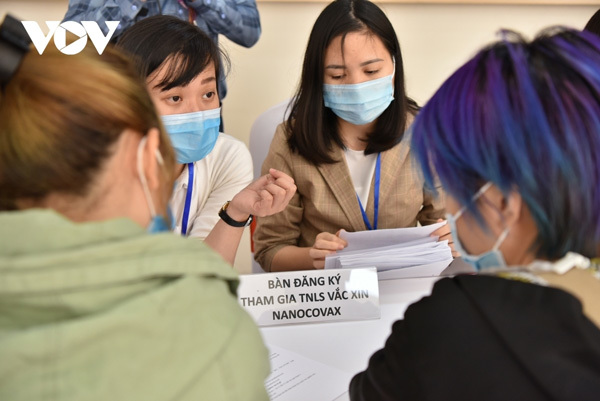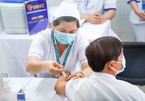 |
Hoang Hoa Son of the Department of Science, Technology and Training under the Ministry of Health, the unit in charge of domestic novel coronavirus (COVID-19) vaccine research, highlighted the correct Vietnamese policy of determining early COVID-19 vaccine production.
Despite this, to have a vaccine for use by all people is not something that is done overnight.
Currently, there are two COVID-19 vaccines that are in the phase of undergoing human trials, including the Institute of Vaccines and Medical Biologicals (IVAC)'s COVIVAC vaccine and Nanogen Pharmaceutical Biotechnology JSC’s Nano Covax vaccine.
With the COVIVAC vaccine, the first phase of the trial involving 120 people has been completed, with 720 blood samples being sent to Canada to evaluate the immunogenicity. It is therefore expected that by the end of June, the initial results for the preliminary assessment of phase one will be complete and trials will be eligible to move to phase two.
With regard to Nanogen's Nano Covax vaccine, the Military Medical Academy under the Ministry of Defence has launched phase three of trial injections, with doses being given to the initial 240 volunteers.
"It is impossible to confirm in which month there will be a vaccine for people because it depends on many factors, such as the urgent pandemic situation and the supply of vaccines.
They are two main indicators to evaluate vaccine effectiveness, namely reduced morbidity and mortality," Son said.
It is entirely possible that after receiving the vaccination, people will still get the disease, although the severity of the virus would drastically decrease. This means individuals could contract the disease, although there would be no need for major treatment.
Currently, as a means of creating herd immunity, up to 80% of the population must have COVID-19 antibodies. In order to have antibodies the only possible ways are to either be infected naturally or have the vaccination, Son stated.
However, natural infection poses many great risks as it could result in treatment facilities being overloaded, with evidence for this being seen in many countries around the world who have paid a heavy price for this option, according to Son.
Vietnam has chosen the second path through vaccinations. As soon as the nation was hit by the COVID-19 pandemic at the beginning of 2020, the Ministry of Health determined that only vaccinations could bring people's life back to normal. They therefore sent official documents requesting local manufacturers to consider the capacity and ability to develop vaccines domestically.
Currently, the pandemic has been brought under basic control. It is therefore anticipated that by the end of September the nation will have approximately six million doses of the COVID-19 vaccine. This includes three million doses of the Astra Zeneca vaccine ordered by the Ministry of Health through the Vietnam Vaccine Joint Stock Company (VNVC) and through the COVAX Facility.
Furthermore, pharmaceutical company Pfizer said that three million doses of the COVID-19 vaccine will be shipped to the country in the third quarter. The vaccines will be allocated according to priority groups in line with the Government's Resolution 21 regarding the purchase of and use of vaccines and localities with industrial zones.
According to details provided by experts, local people should not be overly concerned regarding the current supply of vaccines. Each citizen should continue to strictly follow preventive measures set out by the Ministry of Health and stay active in improving their own health.
Source: VOV

Local COVID-19 vaccination process remains safe
During the initial novel coronavirus (COVID-19) vaccination drive, Vietnam has yet to record any cases of blood clots or thrombosis occurring after injection, according to the Ministry of Health.